Ever clicked ‘I agree’ on a privacy policy without a second thought? It’s a common habit, but our personal data is constantly being collected and used online. Understanding how companies handle this information is more important than ever, yet navigating the dense legal language of privacy policies can feel like an impossible task for the average person. This is where the concept of a Privacy Impact Assessment (PIA) becomes relevant.
A PIA is a process responsible organizations use to identify and minimize the privacy risks of new projects before they ever launch. Think of it as a mandatory safety check, but for your personal data. While businesses are the ones conducting these assessments, knowing about the privacy impact assessment tools they use gives you, the consumer, a powerful insight. It helps you distinguish which companies are genuinely committed to protecting your information versus those just checking a box. This guide is designed to pull back the curtain on these essential platforms.
We've created a comprehensive directory of the leading solutions businesses rely on to safeguard your data. For each tool, we provide a detailed breakdown to help you become a more informed digital citizen. You will find:
- In-depth analysis of platforms like OneTrust, TrustArc, and BigID.
- Screenshots to show you what these tools look like in action.
- Direct links to explore each option further.
- Clear pros and cons from a user perspective.
This resource will demystify the complex world of data privacy management. By the end, you'll have a much clearer picture of the systems working behind the scenes to protect you and be better equipped to make smart choices about who you trust with your data.
1. OneTrust
OneTrust stands as a heavyweight champion in the world of privacy management, offering one of the most comprehensive privacy impact assessment tools available. Think of it as a central command center for all things data privacy, helping businesses understand and document the risks associated with how they handle your personal information. When a large, global company uses OneTrust, it means they have a powerful system to make sure they're following privacy laws everywhere they operate.
Its core strength lies in its ability to automate the entire assessment process. It starts with simple questionnaires to determine if a new product or feature needs a deep dive into its privacy risks. If it does, OneTrust provides pre-built templates based on specific regulations like Europe's GDPR, ensuring the right questions are asked every time. For you, this means the company is systematically checking its work to protect your data.
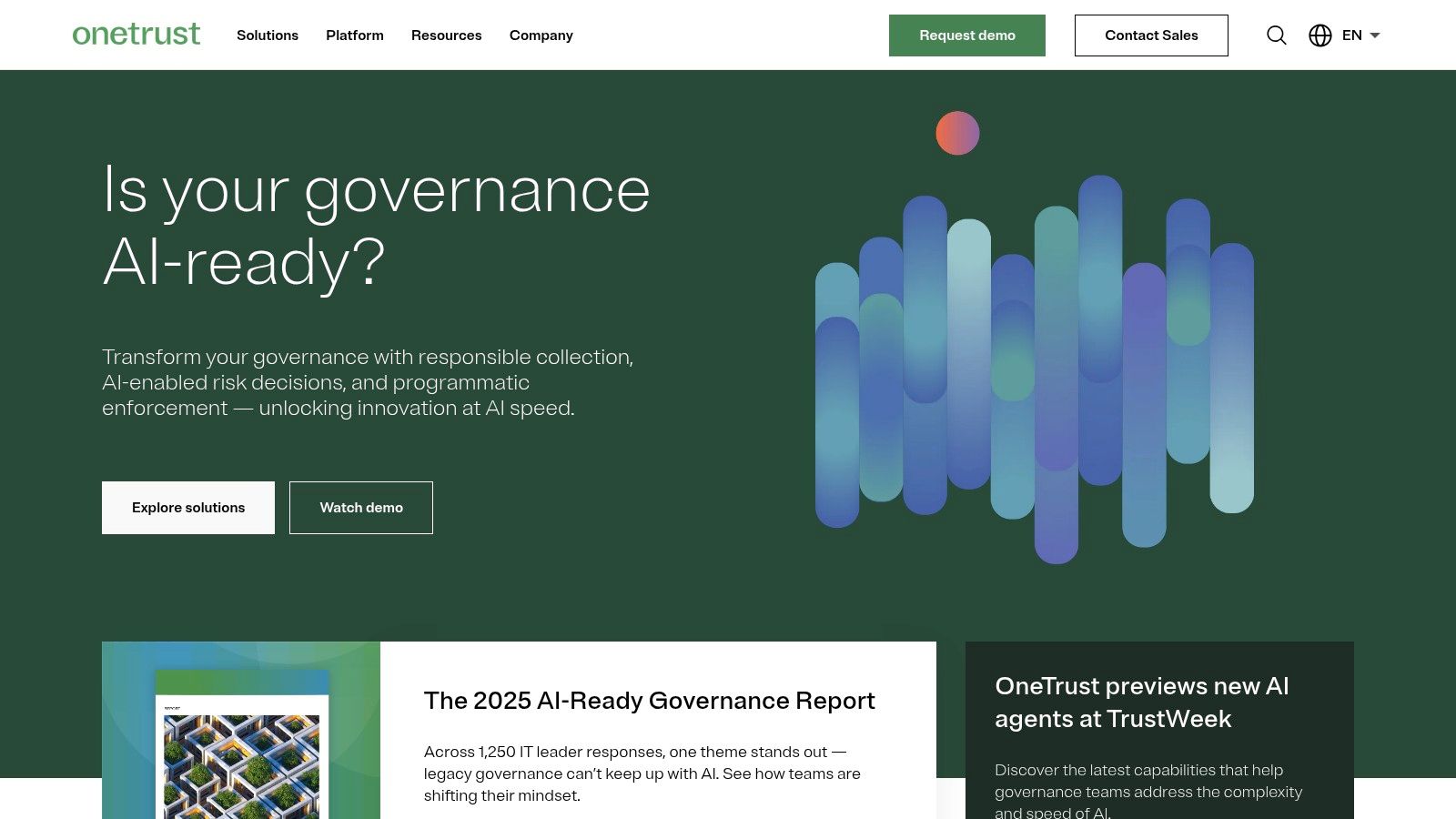
Why It Stands Out
What truly sets OneTrust apart is its integration with a massive, up-to-date database of global privacy laws. This gives its templates and risk-scoring an unmatched level of accuracy. For a company handling data from customers in different countries, this feature is invaluable. For consumers, this means the businesses using OneTrust are equipped with the knowledge to follow the specific privacy laws that protect you, no matter where you live.
The platform goes far beyond just PIAs, covering everything from managing your "right to be forgotten" requests to handling data breaches. This all-in-one approach helps companies put many of the core principles outlined in data privacy best practices into action.
Key Features & Considerations
| Feature | Description |
|---|---|
| Templates & Workflows | Pre-built, customizable checklists and automated workflows. |
| Risk Scoring | Automatically scores privacy risks and suggests ways to fix them. |
| Regulatory Intelligence | Powered by an up-to-date database of global privacy laws. |
| Reporting | Creates detailed reports to prove to regulators they are doing things right. |
- Pros: Extremely comprehensive suite, deep knowledge of international laws, great for large teams.
- Cons: Expensive and aimed at large corporations. It’s a powerful tool that can be complex to use.
- Best For: Large, global organizations that need a powerful, all-in-one platform to manage privacy compliance.
You can request a demo and custom pricing on their website.
2. TrustArc
TrustArc has a long-standing reputation in the data privacy space, offering a mature platform with robust privacy impact assessment tools. It's designed to streamline the entire assessment process, especially for companies that need to show regulators clear proof of their privacy efforts. For you, this means that companies using TrustArc have a structured way to evaluate how a new product or service might impact your personal information before it even launches.
The platform excels at managing different types of privacy checkups using a system of templates and automated workflows. It guides a company’s privacy team through a series of questions, assigns tasks, and tracks progress from start to finish. This organized approach helps ensure that potential privacy risks are identified and addressed early on.
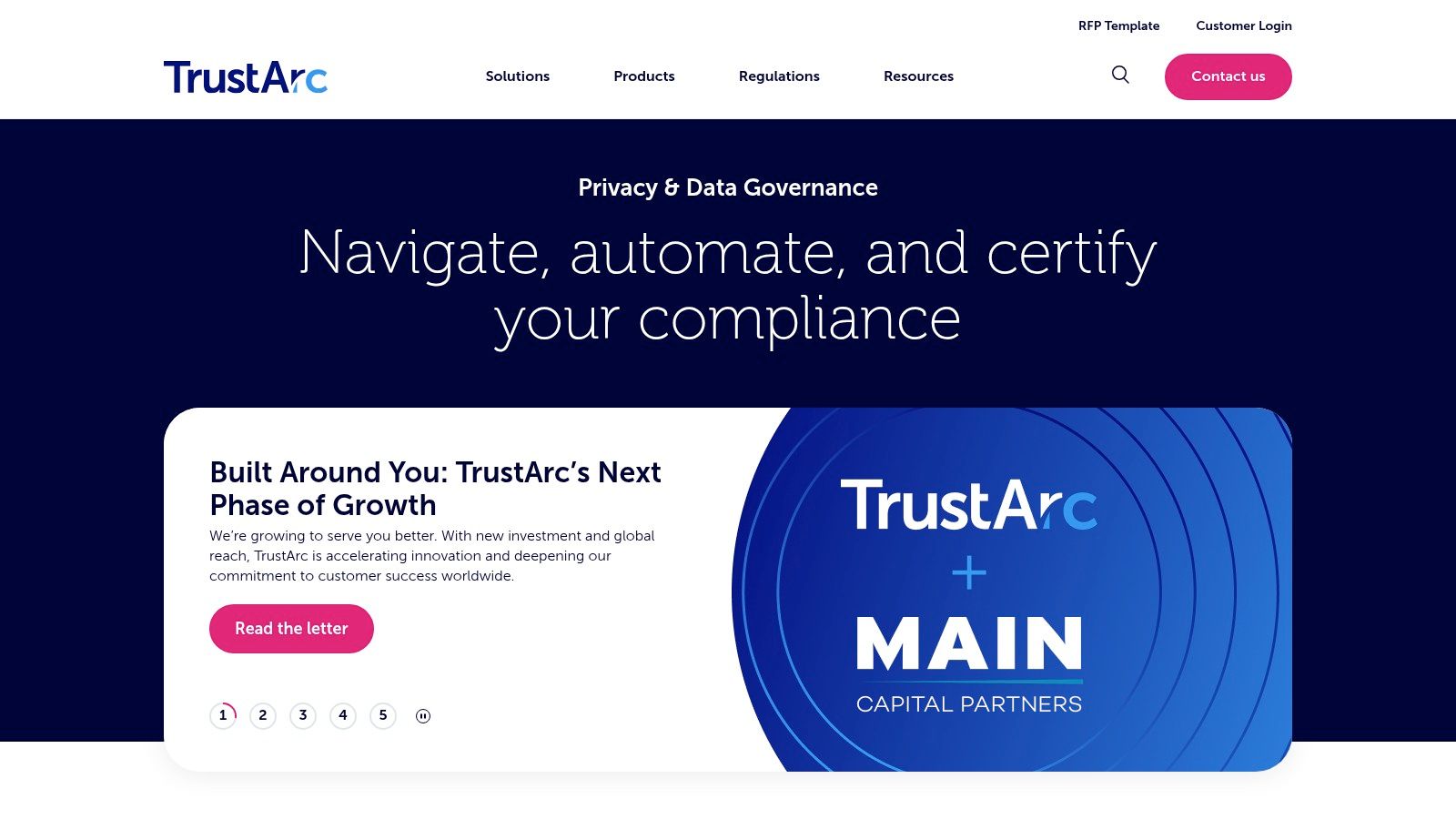
Why It Stands Out
TrustArc distinguishes itself with its rich library of ready-to-use assessment templates. These aren't just generic forms; they are maintained by privacy experts and designed to meet specific legal requirements. This foundation of expertise helps businesses conduct thorough and compliant assessments without having to start from scratch.
Another key feature is its ability to automatically flag high-risk activities that require a privacy assessment. This creates a more proactive approach to privacy management. For you, this translates to a business that is better equipped to spot potential data privacy issues before they become a problem.
Key Features & Considerations
| Feature | Description |
|---|---|
| Assessment Templates | Over 10 ready-to-use privacy assessments maintained by experts. |
| Automated Workflows | Streamlines task assignment and progress tracking. |
| Structured Reporting | Generates clear reports that highlight risks for auditors and managers. |
| Risk Detection | Automatically identifies high-risk activities that need a closer look. |
- Pros: Mature platform with lots of templates, helpful for audits, includes valuable educational resources.
- Cons: Pricing information isn't public. It can be more complex than needed for very small companies.
- Best For: Mid-to-large sized US-based organizations that need a proven, template-driven tool for creating audit-ready privacy assessments.
You can learn more and request a demo through their official website.
3. BigID
BigID takes a different approach to privacy impact assessment tools by starting with the data itself. Instead of just asking people questions about how data is used, its platform first discovers and classifies all the personal information a company holds, from customer lists to internal files. This means when a privacy check is done, it's directly linked to the actual data, providing a much more accurate picture of the risks.
The platform is designed for companies that want to tie their privacy promises directly to their data. Its assessment tool works with this data discovery engine, allowing it to automate large parts of the process. It can automatically create maps showing how your data flows through the company's systems, ensuring everything is consistent and easy to check.
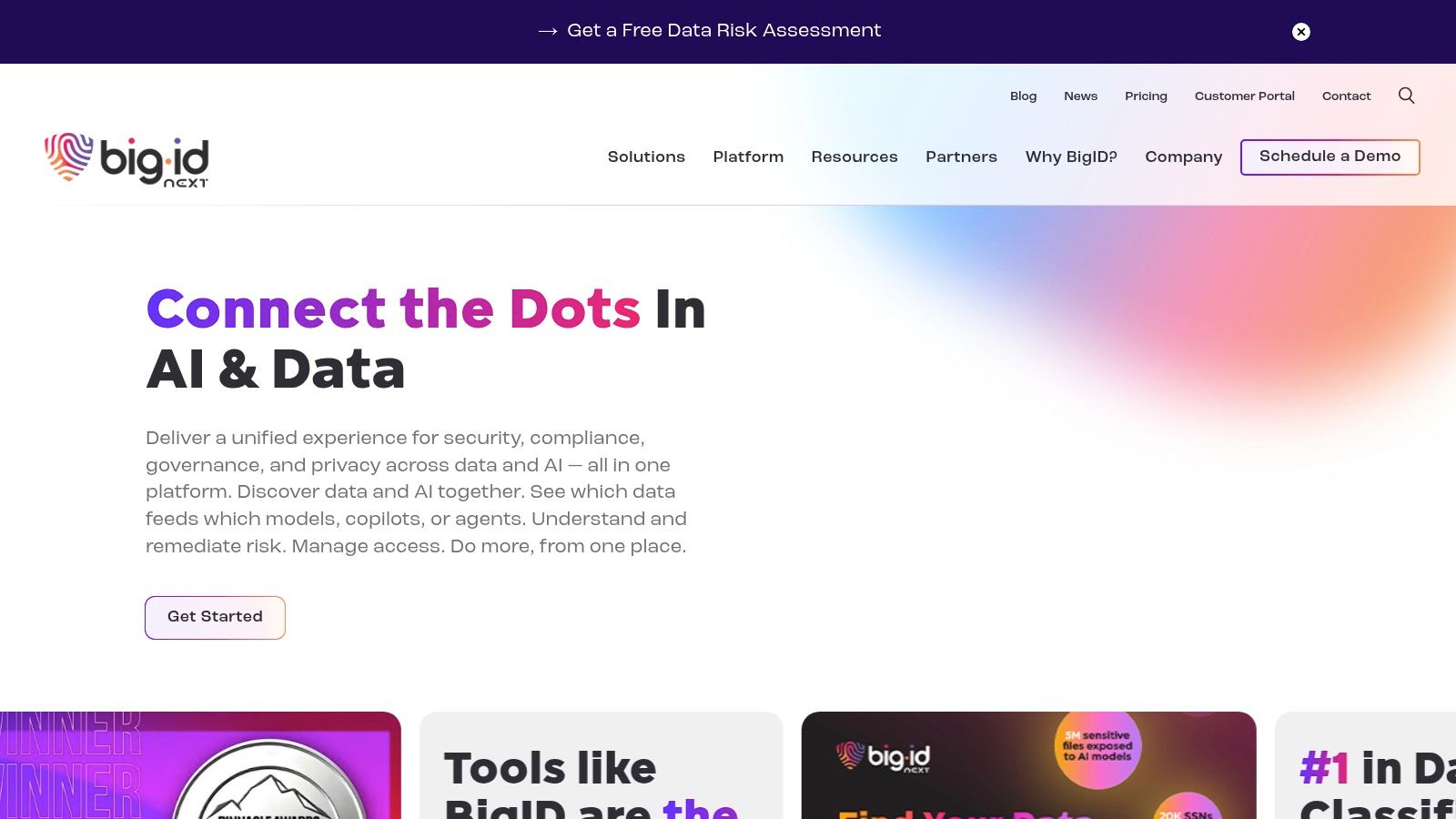
Why It Stands Out
What makes BigID unique is its "data-first" philosophy. Traditional privacy checks rely on human answers, which can be incomplete or wrong. BigID double-checks these answers against the real data it finds, closing a major gap in the process. For you, the consumer, this means the company has a much clearer understanding of where your specific data is and how it’s being used, leading to more meaningful privacy protections.
This approach allows for powerful features like AI-assisted guidance to speed up the process and a central dashboard that tracks issues across all types of assessments. This complete view helps businesses prioritize and fix the most critical privacy risks more effectively.
Key Features & Considerations
| Feature | Description |
|---|---|
| Data-Centric PIAs | Assessments are linked directly to discovered personal data for accuracy. |
| Automation & AI | Automatically generates data flow maps and uses AI to help complete forms. |
| Unified Risk Register | Centralizes risk tracking and repair efforts in one place. |
| Custom Workflows | Offers templates for various risk assessments with customizable steps. |
- Pros: Highly accurate because it's based on real data, AI guidance speeds things up, provides a single view of privacy risk.
- Cons: Requires the broader BigID platform, making it a bigger investment. Pricing is aimed at large corporations.
- Best For: Data-driven companies that want to base their privacy checks on a real-time understanding of where all their customer data is.
You can request a demo and custom pricing on their website.
4. Osano
Osano presents itself as an easy-to-use data privacy platform, making it a strong contender among privacy impact assessment tools, especially for medium-sized companies. It helps businesses manage and document the risks tied to new projects involving personal data, ensuring they think about your privacy from the start. Osano simplifies this complex process with clear steps and helpful guidance, removing much of the guesswork.
The platform streamlines the creation of privacy assessments using pre-built templates based on established standards. This means that even smaller teams without dedicated privacy lawyers can conduct thorough checks. Its focus on automation, like sending reminders and tracking progress, ensures that these crucial privacy reviews don't fall through the cracks.
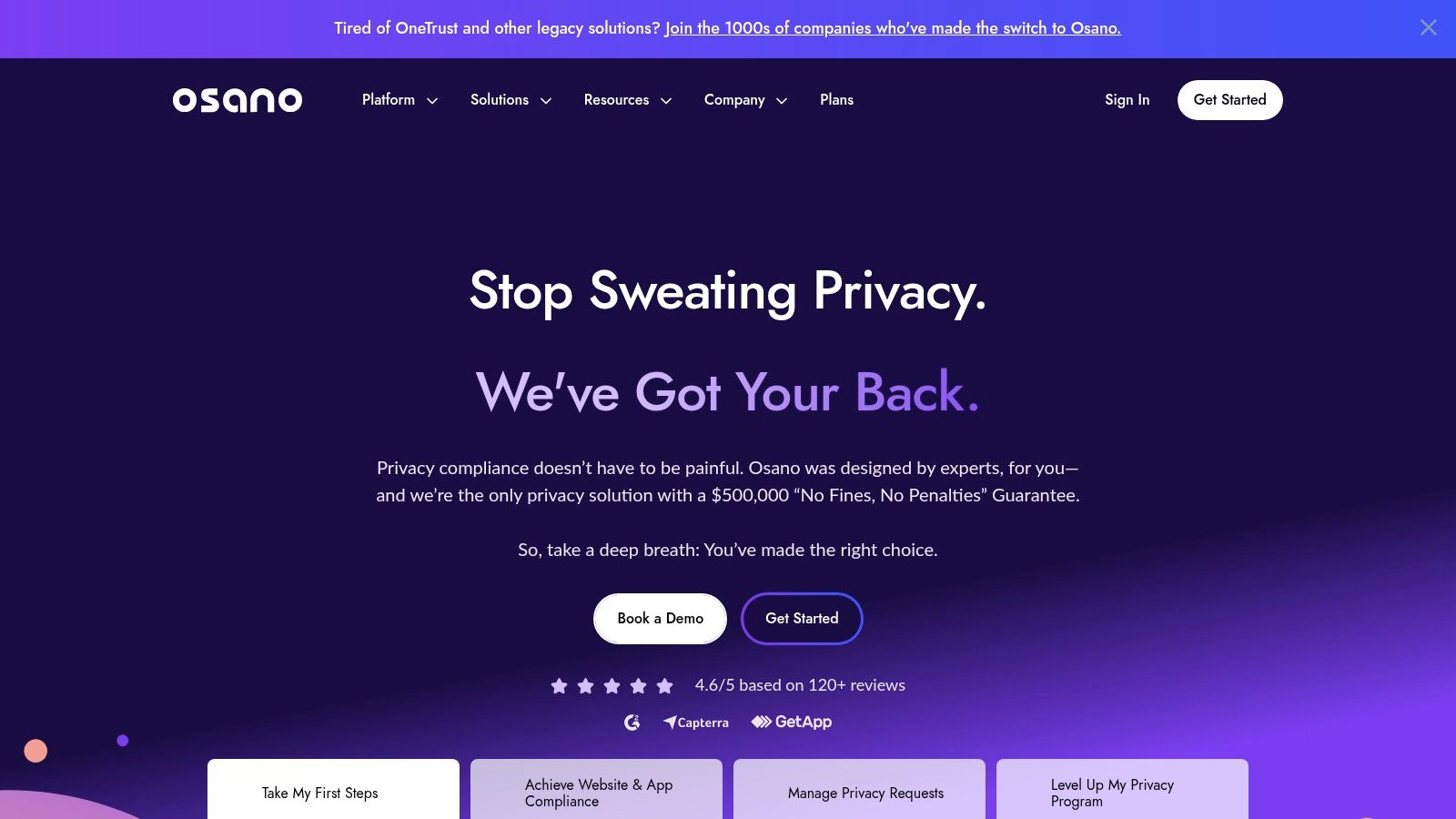
Why It Stands Out
Osano’s key strength is its user-friendly design and quick setup. While other tools for big companies can be overwhelming, Osano is designed to be up and running fast. This makes it a great fit for businesses that need to comply with US state privacy laws (like those in California or Virginia) but don't have the massive resources of a multinational corporation.
The platform's active guidance, including built-in checklists and resources, provides valuable support throughout the assessment. For you, this means businesses using Osano are actively guided to follow best practices in protecting your data, making it easier for them to do the right thing consistently.
Key Features & Considerations
| Feature | Description |
|---|---|
| Assessment Templates | Pre-built and customizable privacy assessment templates based on industry standards. |
| Automated Workflows | Sends automatic reminders and tracks assessment progress to ensure completion. |
| Guidance Resources | Includes integrated checklists and helpful content to guide users. |
| Centralized Management | A single dashboard to manage all privacy and vendor reviews. |
- Pros: Very intuitive and easy to use, quick to set up, great for mid-sized companies and US state law compliance.
- Cons: Advanced features might cost more, and pricing isn't public, requiring a sales call.
- Best For: Mid-sized businesses and organizations focusing on following the growing number of US state privacy laws.
You can sign up for a free trial or request a demo from their website.
5. Securiti
Securiti presents itself as a powerful, data-centric platform where security and privacy meet, offering sophisticated privacy impact assessment tools as part of a larger suite. It's designed for businesses that want to connect their privacy assessments directly to the actual data they hold. This means when a company evaluates the risk of a new project, they can see exactly what data is involved, where it is, and who can access it.
The platform is great at automation, providing ready-to-use templates for various global regulations like GDPR and CCPA, which simplifies the process of starting a privacy check. For you, this integration means that the companies using Securiti are not just filling out forms; they are actively linking their privacy promises to their real-world data security practices, creating a stronger chain of accountability.
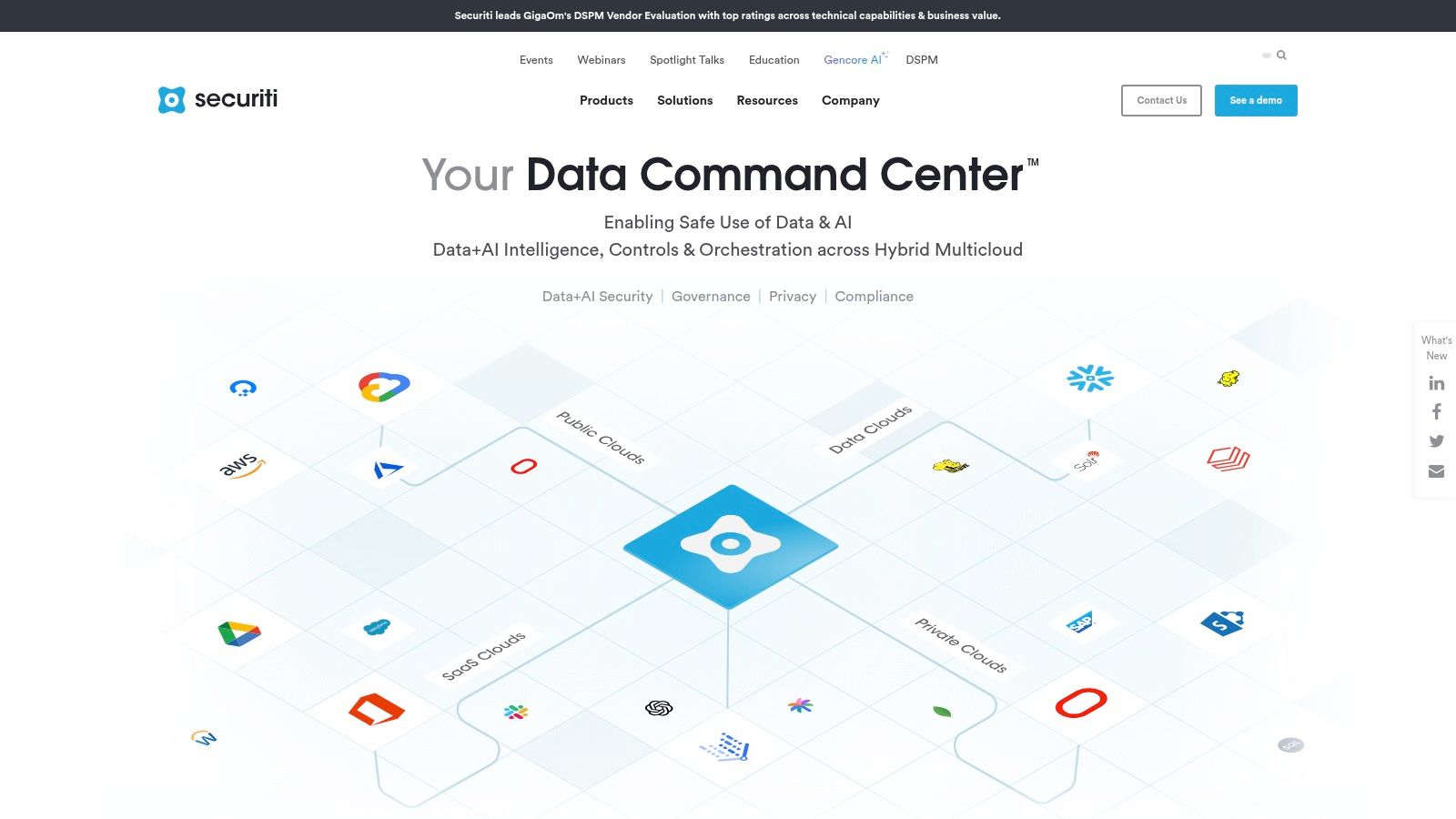
Why It Stands Out
Securiti's key advantage is its deep integration with data discovery and security. Unlike tools that only manage the assessment process, Securiti connects the assessment to the underlying data systems. This allows it to automate evidence collection and provide a real-time view of compliance, ensuring assessments are based on actual data risk rather than just theoretical answers.
This "data-first" approach helps organizations build a more resilient privacy framework. It bridges the gap between the legal team completing the assessment and the IT team managing the data, ensuring everyone is on the same page. This collaborative environment is designed to streamline approvals and keep track of all privacy-related tasks in one place.
Key Features & Considerations
| Feature | Description |
|---|---|
| Out-of-the-Box Templates | Ready-to-use templates for privacy assessments across multiple countries. |
| Custom Template Builder | Allows companies to build or import their own custom assessment templates. |
| Real-time Tracking | A unified dashboard provides a clear view of assessment progress and status. |
| Centralized Repository | Stores all assessments and related evidence for easy auditing and review. |
- Pros: Scales well for companies dealing with many regulations, strong integration with security functions, good for collaboration.
- Cons: Aimed at large companies with a feature set that might be too complex for smaller teams. Pricing requires a demo.
- Best For: Medium to large companies that need to tightly integrate their privacy assessments with their broader data security programs.
You can learn more and request a demonstration on their website.
6. Transcend
Transcend positions itself as a modern, developer-friendly platform, and its approach to privacy assessments reflects that. It offers powerful privacy impact assessment tools designed to deeply integrate with a company's existing data systems, making the process smarter and more automated. For you, this means the businesses using Transcend have a real-time, accurate picture of where your data is, which helps them assess risks to your privacy more effectively.
The platform streamlines assessments for various regulations, from GDPR to specific US state requirements. It acts as a single hub for managing privacy risk, ensuring that when a company builds a new product or feature, your privacy is considered from the very beginning—a concept known as "privacy by design."
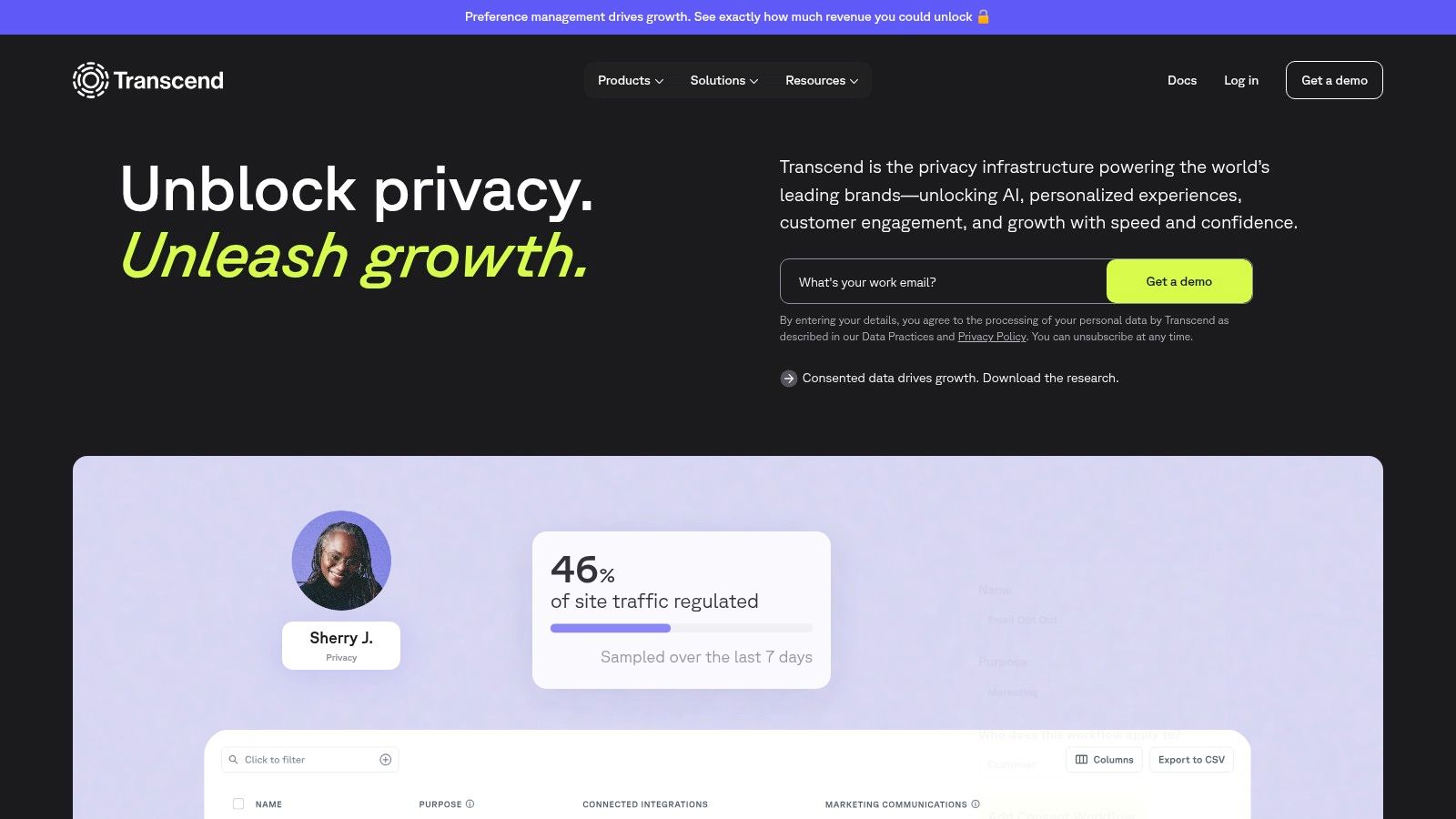
Why It Stands Out
Transcend’s key advantage is its direct integration with a company's data inventory. Instead of someone manually answering questions about what data is being used, the tool can often pull that information automatically. Its smart suggestion engine uses this information to auto-fill parts of the assessment, significantly speeding up the process and reducing human error. This tight connection between the data a company actually holds and its risk assessments is a huge step forward.
This automation means assessments are not just a one-time checklist but a living part of the company's data management. It helps ensure that as systems change, the understanding of privacy risks changes with them, which is critical for protecting your information over the long term.
Key Features & Considerations
| Feature | Description |
|---|---|
| Attribute-Driven Suggestions | Uses data inventory information to automatically suggest answers and risks. |
| Single Hub | Manages different types of risk assessments in one unified platform. |
| Data Inventory Integration | Connects directly to a company's data systems for accurate information. |
| Collaboration Tools | Built-in workflows to streamline reviews between legal, engineering, and other teams. |
- Pros: Excellent modern user experience, strong automation, friendly for developers to use.
- Cons: Works best when using the whole Transcend platform. Pricing is not publicly listed.
- Best For: Tech-forward companies looking for a highly automated solution to embed privacy assessments directly into their development and data workflows.
You can learn more and request a demo directly on their website.
7. DataGrail
DataGrail offers a smart, integration-first approach to privacy impact assessment tools, designed for modern tech companies. It focuses on reducing the tedious manual work involved in assessments by connecting directly to the other software a business uses, like Salesforce or Slack. This allows it to automatically pull in information about how data is being handled, which is a huge time-saver and accuracy booster.
The platform's main advantage is its library of over 2,000 pre-built connections to popular systems. When a company needs to conduct a privacy assessment, DataGrail uses these connections to pre-populate the forms with up-to-date details. This ensures the information is always accurate and reflects what's actually happening with your data.
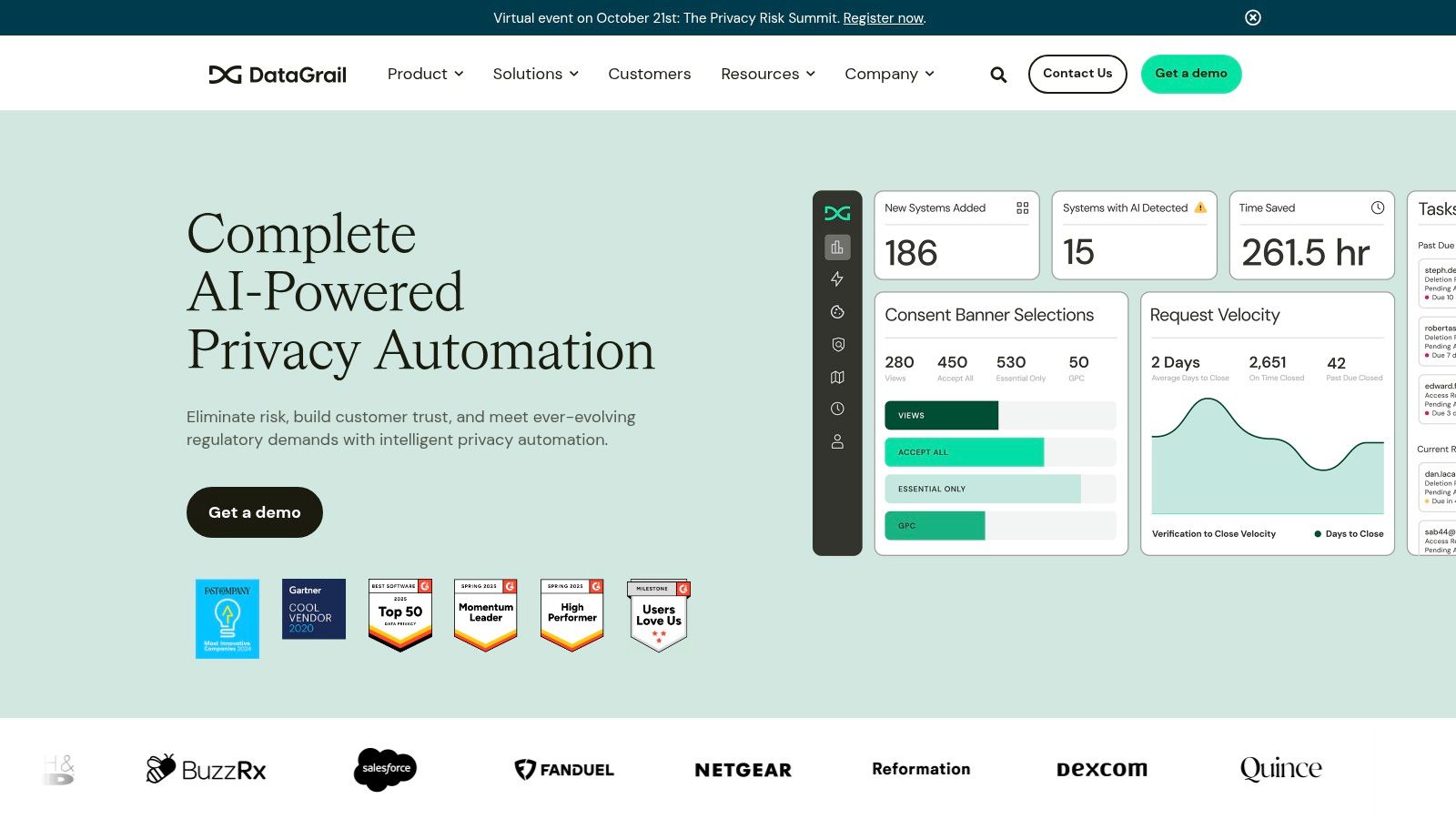
Why It Stands Out
What makes DataGrail unique is how it uses its data mapping capabilities to power its assessments. Instead of just giving you a blank form to fill out, it actively helps complete it. For you, this means the business has a live, accurate inventory of where your data is stored and how it’s used, which is the foundation for a trustworthy privacy assessment.
The platform also uses AI to help identify potential privacy risks, flagging issues that might otherwise be missed. By combining this intelligence with automated data discovery, DataGrail provides a more dynamic and less error-prone way for companies to manage their privacy duties, ensuring assessments are an ongoing, accurate record.
Key Features & Considerations
| Feature | Description |
|---|---|
| System Integrations | Prefills assessment data from over 2,000 connected systems. |
| Smart Templates | Offers templates for privacy assessments and supports periodic re-checks. |
| AI Risk Identification | Uses AI to scan for and identify potential privacy risks automatically. |
| Centralized Evidence | Manages all assessment documents in one place for easy auditing. |
- Pros: Dramatically reduces manual work with its many integrations, keeps data accurate, and works well with the broader DataGrail platform.
- Cons: Best used as part of their whole suite of tools. Pricing requires contacting their sales team.
- Best For: US-based tech companies already using DataGrail for managing data requests and data mapping.
You can learn more and request pricing directly on their website.
8. TerraTrue
TerraTrue shifts the focus of privacy assessments from a legal task to a core part of product development. It’s built for modern tech companies that need to move fast without breaking privacy rules. This platform embeds privacy checks directly into the software development process, automating the decision of when and how to conduct privacy impact assessment tools. For you, this means the apps and services you use are designed with your privacy in mind from the very first line of code.
Its strength is its workflow that connects directly with engineering tools. When a developer plans a new feature that might involve your personal data, TerraTrue automatically flags it and triggers the necessary privacy review. This proactive approach ensures privacy isn't an afterthought but a core component of product design, helping to prevent data risks before a product ever reaches you.
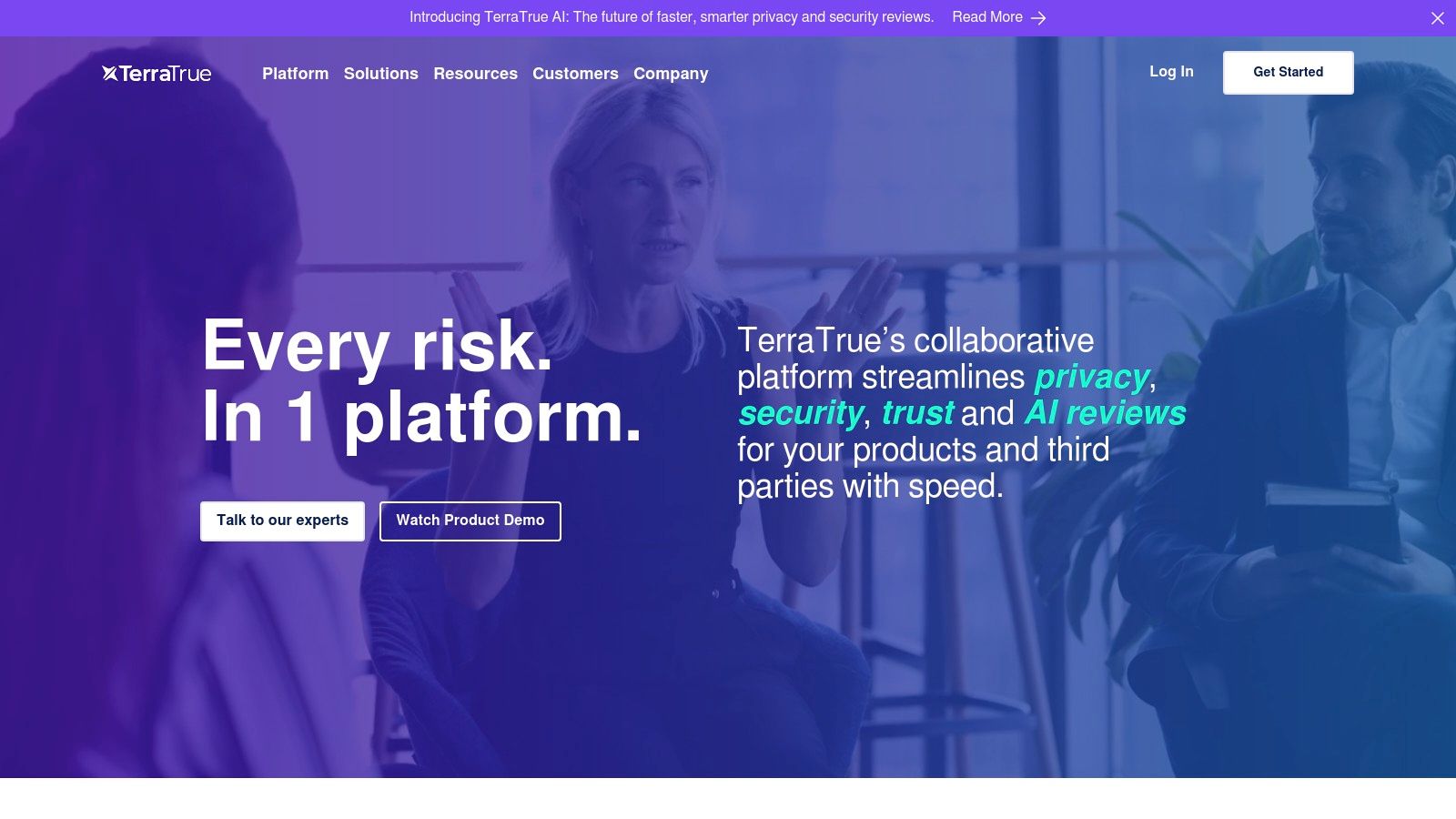
Why It Stands Out
What makes TerraTrue unique is its deep integration with the tools developers already use, like Jira and Slack. It bridges the gap between legal, privacy, and engineering teams, allowing them to collaborate seamlessly. Instead of privacy teams chasing down engineers for information, the platform automatically gathers information and starts assessments based on pre-set risk signals.
This "privacy-by-design" automation is a game-changer. It translates complex legal requirements into actionable steps for developers, ensuring that the services being built are compliant from the ground up. This helps companies innovate quickly while maintaining a strong commitment to protecting your data.
Key Features & Considerations
| Feature | Description |
|---|---|
| Automatic Triggers | Uses risk signals to automatically launch privacy assessments when needed. |
| SDLC Integration | Connects with product development tools to embed privacy checks into existing workflows. |
| Collaborative Hub | Provides a central space for engineering, legal, and privacy teams to work together. |
| Evidence Repository | Creates a centralized, audit-ready trail of all privacy reviews and decisions. |
- Pros: Excellent for building privacy into the software development process, helps teams collaborate, provides clear guidance.
- Cons: Best for companies who adopt the whole TerraTrue platform, and pricing is only available via a custom quote.
- Best For: Fast-paced tech companies that want to build privacy directly into their development process from the start.
You can schedule a demo and receive custom pricing through their website.
9. Proteus-Cyber
Proteus NextGen Data Privacy is a comprehensive suite designed to manage an entire privacy program from a single hub. For you, this means businesses using Proteus have a powerful system to map out where your data goes, assess risks, and ensure they are following the rules. It provides robust privacy impact assessment tools that help companies identify and fix potential privacy issues before they affect you.
The platform is built for global companies, offering tools to comply with multiple international laws like GDPR and CCPA. It automates much of the assessment process, from initial screening questions to detailed risk scoring and generating reports. This helps organizations maintain a consistent and accountable approach to protecting your personal information, regardless of where you live.
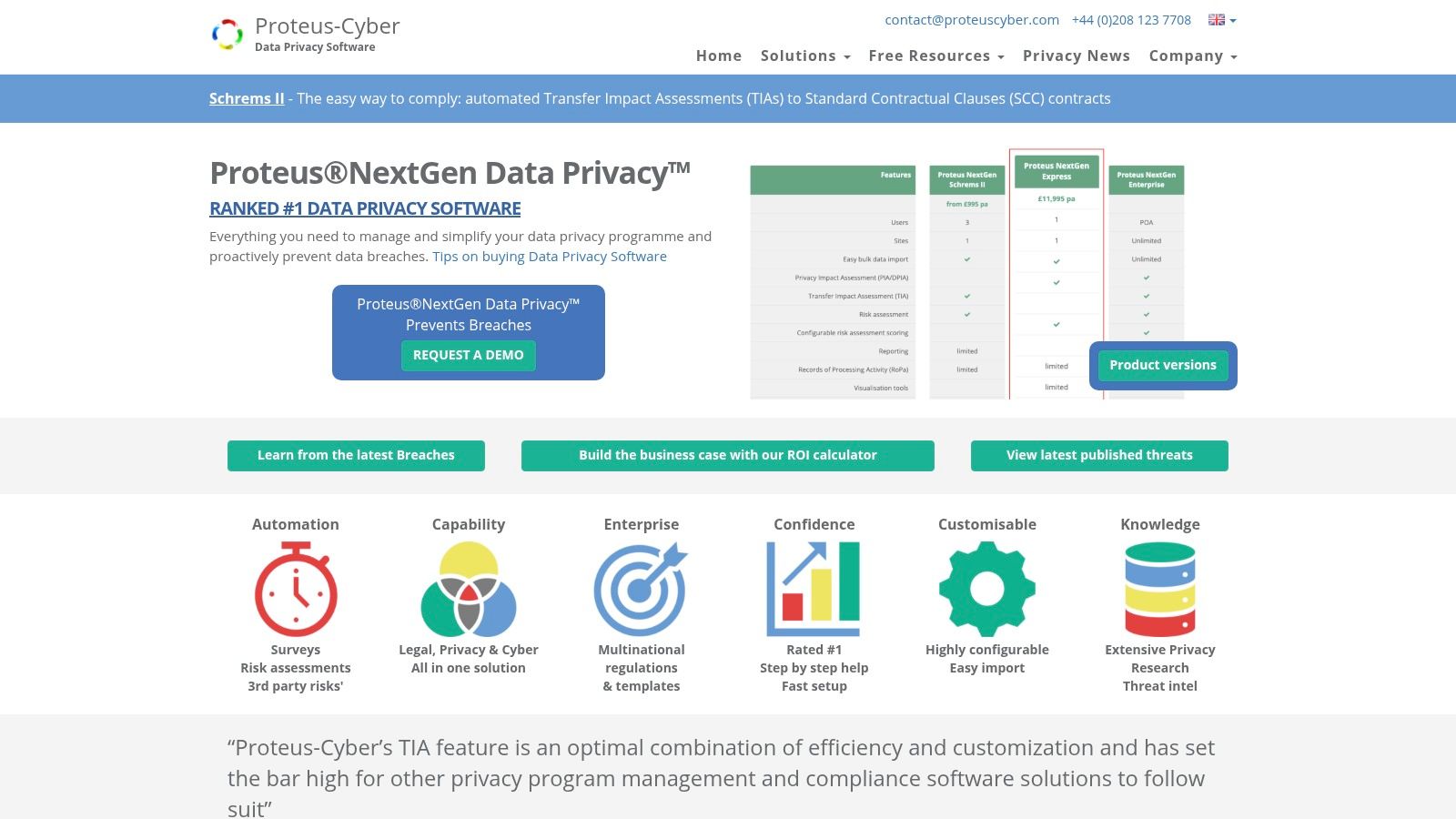
Why It Stands Out
Proteus-Cyber's key advantage is its all-in-one, integrated nature. It doesn't just handle privacy checks; it connects them directly to other essential privacy functions like mapping data flows, managing your data requests, and handling potential data breaches. This interconnected system ensures that a risk identified in a privacy assessment is automatically flagged across the entire privacy program.
This complete view is crucial for effective data protection. When a business understands the full journey of your data, from collection to deletion, it can make more informed decisions. This translates to a more coherent and reliable data protection strategy from the companies you interact with, ensuring that assessments lead to real actions that protect your privacy.
Key Features & Considerations
| Feature | Description |
|---|---|
| Integrated PIA/DPIA | Assessments are linked with data mapping and other privacy tools. |
| Data Mapping | Visualizes data flows for clear oversight. |
| Risk Scoring | Automated risk scoring helps prioritize and fix potential privacy threats. |
| Multi-Law Support | Built-in support for GDPR, CCPA, and other global regulations. |
- Pros: Comprehensive all-in-one privacy platform, strong automation for assessments, designed for global use.
- Cons: The large suite of tools can feel complex for smaller teams. Pricing is not publicly available.
- Best For: Medium to large organizations that need an integrated platform to manage a global privacy program, not just isolated assessments.
You can learn more and request a demonstration from their official website.
10. IAPP Resource Center
Unlike automated software, the International Association of Privacy Professionals (IAPP) Resource Center is more like a library of privacy knowledge. It doesn't perform assessments, but it provides the templates, guides, and training that privacy professionals use to conduct privacy impact assessments themselves. For you, this means the privacy experts at companies are using an authoritative source to learn how to protect your data correctly.
The IAPP provides access to highly respected materials that are considered a gold standard for conducting thorough assessments. It’s where a company’s privacy team goes to check their process and ensure their methods are sound, rather than just clicking buttons in a piece of software. It helps build a strong internal culture of privacy from the ground up.
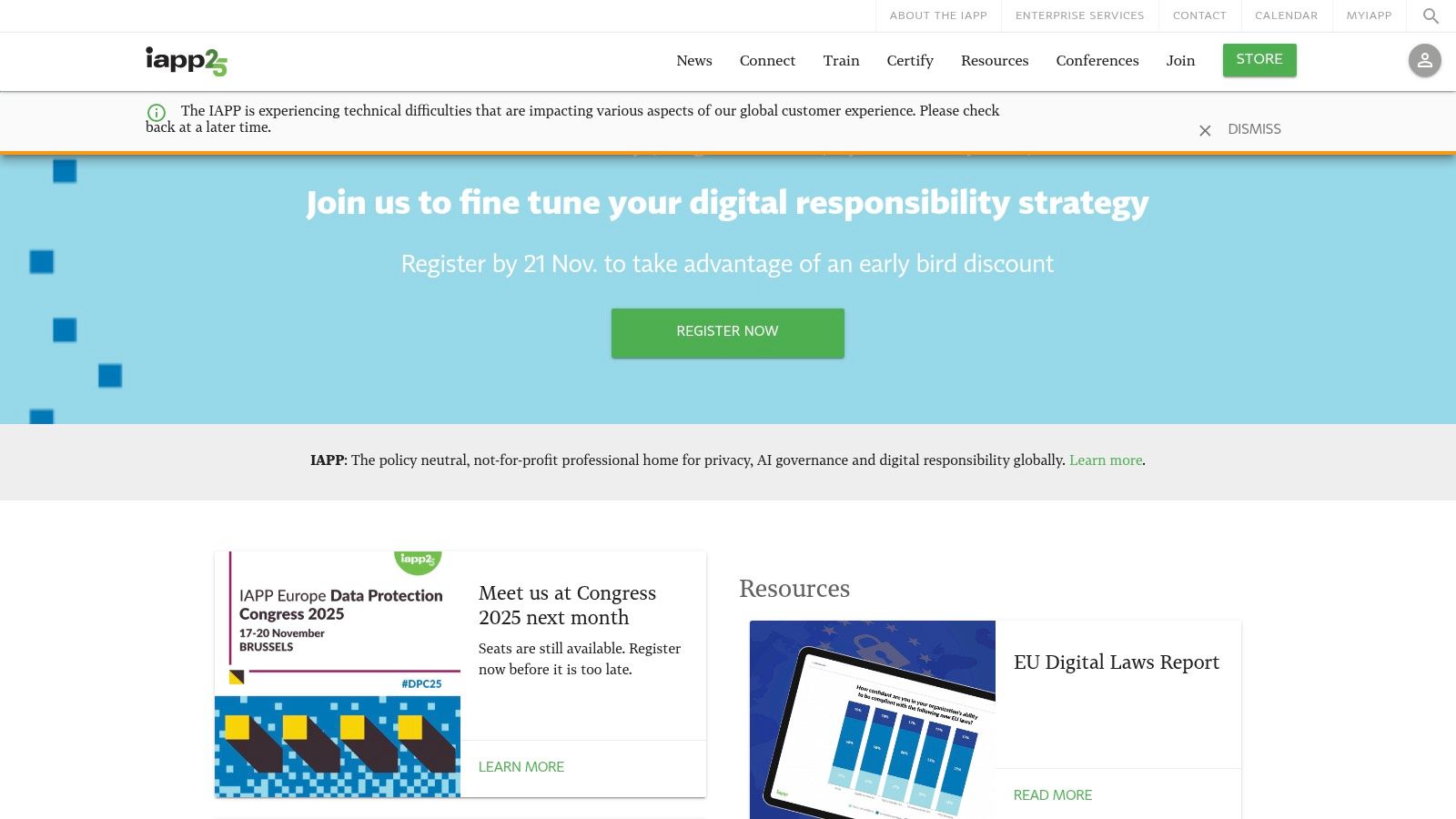
Why It Stands Out
What makes the IAPP Resource Center unique is its authority and focus on human expertise. Instead of automating a task, it educates the user. It’s the official hub for privacy certifications, meaning the content is constantly updated and reviewed by the world’s top privacy professionals. This ensures the information is not just current but also practical and legally sound.
Its resources are critical for understanding the "why" behind privacy assessments, not just the "how." This foundational knowledge is crucial for handling complex situations that automated tools might miss, such as a company's unique obligations under data breach notification requirements.
Key Features & Considerations
| Feature | Description |
|---|---|
| Authoritative Templates | Access to reputable, expertly crafted privacy assessment templates and guides. |
| Training & Certification | An entire ecosystem for professional development in data privacy. |
| Global Coverage | Materials cover a wide range of global regulations. |
| Community & News | Provides access to a global community and the latest privacy news. |
- Pros: Highly authoritative and regularly updated resources, excellent for standardizing a company’s internal privacy methods.
- Cons: Not an automated software platform; it provides knowledge, not tools. Some content requires a paid membership.
- Best For: Privacy teams and companies focused on building deep, in-house expertise rather than relying solely on software.
You can explore free resources or sign up for membership on their website.
11. UK ICO
While not a software tool, the UK’s Information Commissioner's Office (ICO) provides an essential resource for any company conducting a privacy assessment. The ICO offers official guidance and free templates that serve as a gold standard for privacy assessments under Europe's GDPR. Think of it as the official instruction manual for understanding and documenting data risks, straight from the source.
The resources are designed to walk companies through the entire assessment process step-by-step. They provide clear checklists on when an assessment is necessary and outline the specific questions that need to be answered to be compliant. This makes the UK ICO's website an indispensable starting point for smaller businesses or anyone new to privacy management.
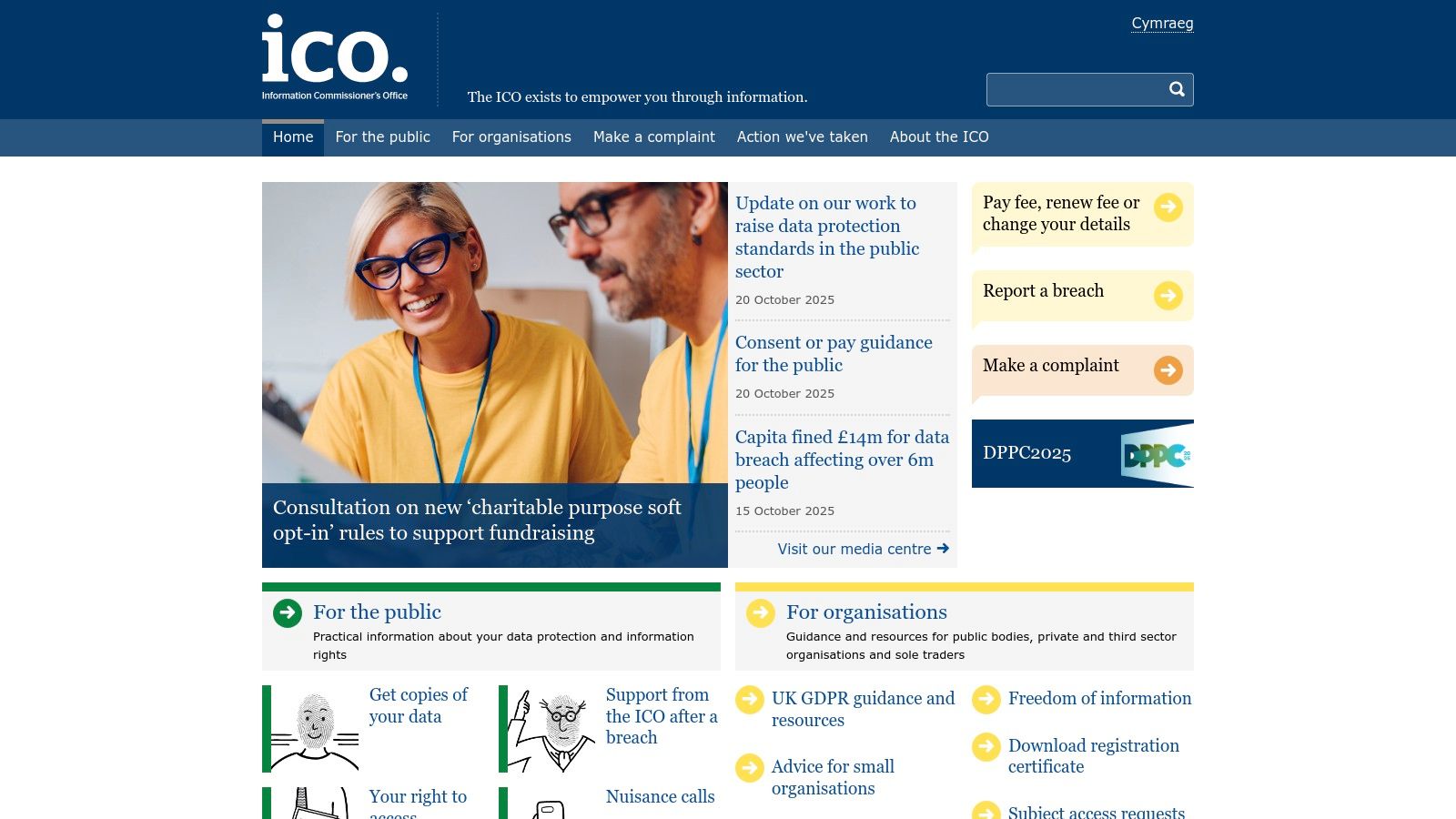
Why It Stands Out
What makes the ICO’s resources unique is their authority and clarity. Because this guidance comes directly from a leading data protection regulator, it provides a trusted baseline for best practices. For you, this means a business using the ICO's framework is following a process trusted by the very body that enforces these privacy laws. The templates are clear, logical, and focused entirely on meeting legal requirements.
The site also offers industry-specific examples, which helps translate abstract legal rules into real-world scenarios. This practical approach is key to understanding and applying privacy rules correctly, which is part of navigating regulatory change management.
Key Features & Considerations
| Feature | Description |
|---|---|
| Official Template | A free, downloadable privacy assessment template that follows GDPR rules. |
| Process Guidance | Detailed, step-by-step instructions on the entire assessment process. |
| DPIA Triggers | Clear criteria to help determine if an assessment is legally required. |
| Sector Examples | Practical examples of completed assessments for specific situations. |
- Pros: Completely free, regulator-approved guidance provides a strong compliance foundation, clear and easy-to-understand.
- Cons: UK-centric focus may need to be adapted for other countries. It is purely information, with no software tools.
- Best For: Small businesses, startups, and anyone seeking a free, authoritative, and foundational resource for GDPR-aligned privacy assessments.
You can access all guidance and templates for free on their website.
12. AWS Marketplace
AWS Marketplace isn't a single tool itself, but rather a digital catalog where companies can find, buy, and use various privacy impact assessment tools from other vendors. For businesses already using Amazon Web Services (AWS), it acts as a streamlined shopping hub. This simplifies the process of finding and paying for privacy software by adding the cost to their existing AWS bill.
Instead of offering one solution, the platform gives companies a choice of many, from specialized software to professional consulting services that can perform privacy assessments for them. This model allows organizations to find a solution that fits their specific needs and budget, all within the familiar AWS ecosystem.
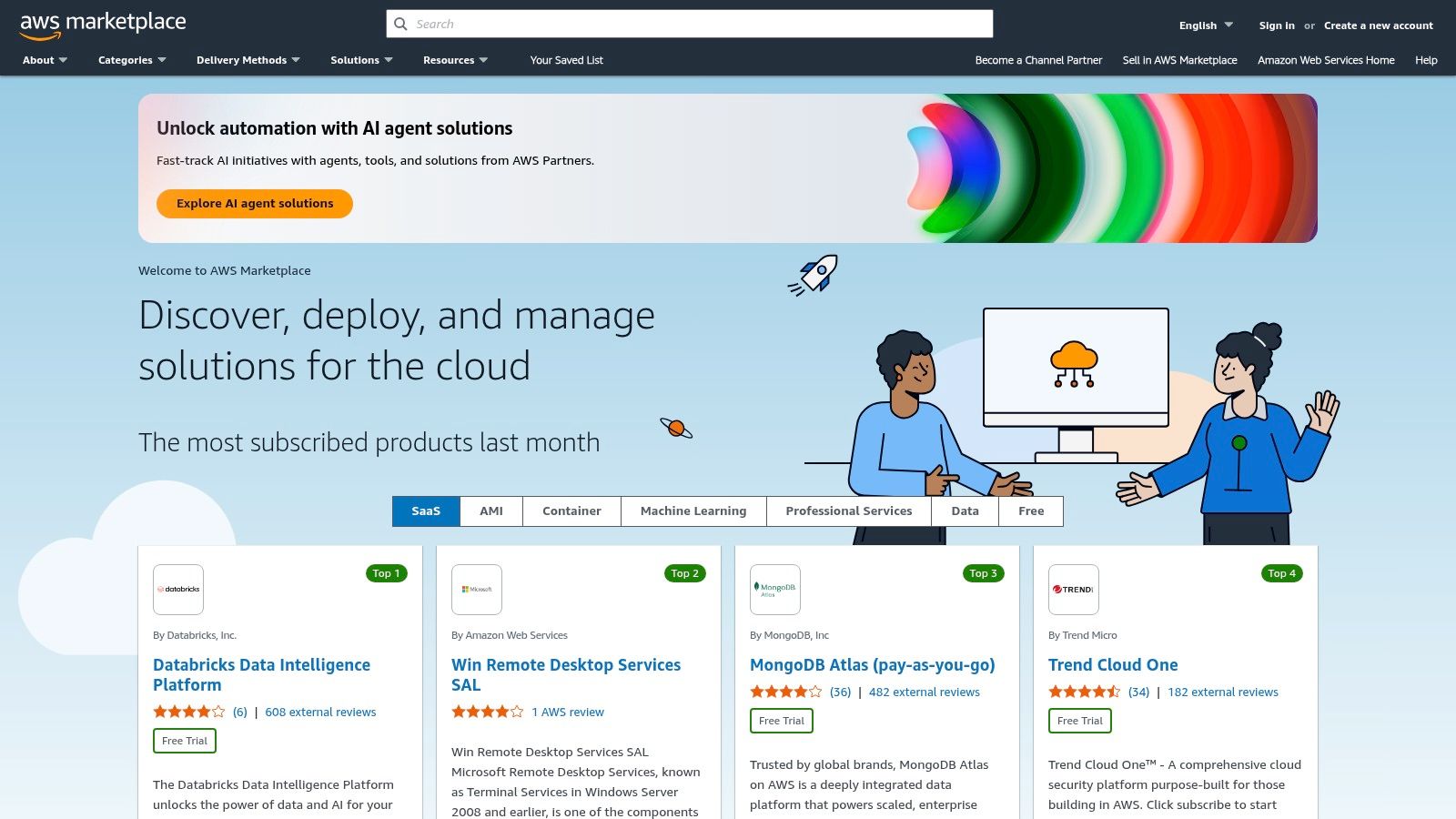
Why It Stands Out
The key advantage of AWS Marketplace is its convenience for existing AWS customers. It streamlines adding new vendors, security reviews, and billing, which can be a major headache for companies. For you, the consumer, this means that companies using AWS can more easily access a variety of privacy tools to help them responsibly manage your data.
This approach provides flexibility, allowing a business to choose between a fully automated software solution or engaging human experts for a more hands-on privacy assessment. The ability to mix and match software with professional services makes it a unique and powerful resource for building a comprehensive privacy program.
Key Features & Considerations
| Feature | Description |
|---|---|
| Centralized Procurement | Discover, buy, and manage third-party privacy software and services in one place. |
| Consolidated Billing | All purchases are added to the organization's existing AWS bill. |
| Varied Offerings | Listings include both software tools and professional consulting services. |
| Standardized Terms | Offers standardized licensing terms to simplify and speed up the buying process. |
- Pros: Excellent for existing AWS users, simplifies billing, offers a mix of software and human-powered services.
- Cons: The quality of the tools varies significantly between sellers, requiring careful research. Many listings don't have public pricing.
- Best For: Organizations deeply embedded in the AWS ecosystem that want to simplify how they buy their privacy and compliance tools.
You can browse the available solutions on the AWS Marketplace website.
Privacy Impact Assessment Tools Comparison
| Solution | Core Features ✨ | User Experience ★ | Value Proposition 💰 | Target Audience 👥 | Unique Selling Points 🏆 |
|---|---|---|---|---|---|
| OneTrust | PIA/DPIA automation, templates, risk scoring, APIs | Enterprise-grade, workflow-rich ★★★★ | Premium, quote-based 💰 | Large enterprises 👥 | Deep regulatory content, broad privacy suite |
| TrustArc | Configurable templates, workflows, executive dashboards | Mature ecosystem, audit-ready ★★★ | Quote/demo pricing 💰 | US orgs, auditors 👥 | Template-rich, educational resources |
| BigID | Data discovery integration, AI guidance, risk tracking | Strong analytics, AI-driven ★★★★ | Enterprise-focused, quote-only 💰 | Enterprises using data platforms 👥 | Data-linked PIAs, unified risk view |
| Osano | ISO/NIST templates, automated reminders, checklists | Intuitive, quick start ★★★★ | Tiered, sales contact pricing 💰 | Mid-market, US state privacy 👥 | Prebuilt templates, active guidance content |
| Securiti | Multi-jurisdiction templates, real-time tracking | Collaboration-friendly ★★★☆ | Demo/quote pricing 💰 | Enterprises, multi-regulation 👥 | Security integration, centralized audit repository |
| Transcend | Attribute-driven prompts, single hub, automation | Modern, developer-friendly ★★★★ | Quote-based pricing 💰 | Privacy-by-design teams 👥 | Auto-suggestions, data inventory integration |
| DataGrail | Integration-powered prefill, AI risk ID | Reduced manual effort ★★★☆ | Sales engagement pricing 💰 | US companies using DataGrail 👥 | 2000+ integrations, audit-ready management |
| TerraTrue | Risk-triggered PIAs, launch-centric workflows | SDLC integrated, collaborative ★★★ | Quote-only, platform preferred 💰 | Product privacy teams 👥 | Launch-triggered assessments, engineering-legal cooperation |
| Proteus-Cyber | PIA/DPIA automation, data mapping, global compliance | Comprehensive but complex ★★★ | Pricing not public 💰 | Large global orgs 👥 | All-in-one privacy governance suite |
| IAPP Resource Center | Authoritative templates, training, certification | Learning-focused ★★★☆ | Membership for premium content 💰 | Privacy professionals 👥 | Authoritative resources, standardization focus |
| UK ICO | Official DPIA template, sector examples | Free, regulator-authored ★★★★ | Free 💰 | UK & GDPR-focused orgs 👥 | Official templates, GDPR-aligned guidance |
| AWS Marketplace | Procurement of software & consulting, consolidated billing | Mixed quality, streamlined buying ★★☆ | Vendor-dependent pricing 💰 | AWS ecosystem users 👥 | Centralized billing, variety of solutions |
Empower Your Privacy: Your Next Steps
Navigating the world of data privacy can feel overwhelming. After reviewing a comprehensive list of privacy impact assessment tools, from enterprise-grade platforms like OneTrust and BigID to government resources like the UK ICO's templates, one thing is clear: the mechanisms for protecting data are complex and powerful. These systems are what companies should be using behind the scenes to evaluate how new projects, apps, or services might affect your personal information.
For the everyday consumer, you won't be logging into Securiti or running a PIA with Osano. However, understanding that these tools exist is a crucial piece of the privacy puzzle. It transforms you from a passive user into an informed digital citizen. You now know the questions to ask and the standards to expect. When a company collects your data, you can ask, "Have you conducted a Privacy Impact Assessment for this?" This knowledge empowers you to hold businesses accountable.
Key Takeaways from Our Review
The landscape of privacy impact assessment tools is diverse, catering to different business sizes, industries, and technical needs. Here are the most important insights to remember:
- No One-Size-Fits-All Solution: A small startup has vastly different needs than a multinational corporation. While a tool like DataGrail excels at integrating with SaaS apps for modern tech companies, a more established organization might lean on TrustArc for its deep policy and regulatory expertise.
- Automation is Key, But Not Everything: Tools like Transcend and Securiti leverage powerful AI and automation to map data and identify risks. This is a massive leap forward, but human oversight, legal expertise, and ethical judgment remain irreplaceable components of a successful privacy program.
- Accessibility Matters: Free resources from bodies like the IAPP and the UK ICO are invaluable. They provide a foundational understanding and practical templates that democratize privacy management, proving that you don't always need a high-priced subscription to start doing the right thing.
How to Move Forward: Your Action Plan
Your journey toward digital empowerment doesn’t end here. Armed with this new knowledge, you can take practical, meaningful steps to protect your privacy and advocate for better data handling practices.
1. Question the Services You Use: Before you click "Accept" on the next privacy policy, pause. Ask yourself if you trust this company with your data. Look for a dedicated privacy center on their website. The presence of clear, accessible privacy information is often a good sign they take their responsibilities seriously.
2. Leverage Your Rights: Remember regulations like GDPR and CCPA? They grant you rights, such as the right to access or delete your data. Don't be afraid to use them. Many companies that use sophisticated privacy platforms have automated portals to handle these requests.
3. Choose Privacy-First Alternatives: Whenever possible, opt for services that build privacy into their core design. This sends a powerful message to the market that consumers value and demand better data protection. Your choices influence corporate behavior more than you think.
4. Implement Strong Personal Security: The best corporate privacy program can't protect you from a weak password. Use a password manager, enable two-factor authentication (2FA) on all your accounts, and be cautious about the information you share online.
Ultimately, the existence and evolution of sophisticated privacy impact assessment tools are a positive sign. They show a growing recognition that privacy is not just a legal checkbox but a fundamental human right in the digital age. By understanding the systems designed to protect you, you become an active participant in your own digital safety. You gain the confidence to question, the knowledge to demand better, and the power to make choices that align with your values.
The first step in protecting yourself is understanding what you're agreeing to. With TermsEx, our AI-powered analyzer, you can instantly translate dense privacy policies and terms of service into simple, clear summaries. Use the knowledge from this article to scrutinize what companies are doing, and use our tool to understand what they're telling you. Take control of your digital agreements today with TermsEx.